
Period pain is common and a normal part of your menstrual cycle. Most women experience it at some point in their lives.
It's usually felt as painful muscle cramps in the tummy, which can spread to the back and thighs.
The pain sometimes comes in intense spasms, while at other times it may be dull but more constant.
It may also vary with each monthly period. Some periods may cause little or no discomfort, while others may be more painful.
Sometimes you may experience pelvic pain even when you don't have your period.
What causes period pain?
Period pain occurs when the muscular wall of the womb tightens (contracts). Mild contractions continually pass through your womb, but they're usually so mild that most women can't feel them.
During your period, the wall of the womb starts to contract more vigorously to encourage the womb lining to shed away as part of your monthly period.
When the muscular wall of the womb contracts, it compresses the blood vessels lining your womb. This temporarily cuts off the blood supply – and hence oxygen supply – to your womb. Without oxygen, the tissues in your womb release chemicals that trigger pain.
While your body is releasing these pain-triggering chemicals, it's also producing other chemicals called prostaglandins. These encourage the womb muscles to contract more, further increasing the level of pain.
It's not known why some women experience more period pain than others. It may be that some women have a build-up of prostaglandins, which means they experience stronger contractions.
Period pain caused by a condition
Less commonly, period pain can be caused by an underlying medical condition. Doctors sometimes call this secondary dysmenorrhoea.
Period pain linked to an underlying condition tends to affect older women. Women aged 30 to 45 are most commonly affected.
Conditions that can cause period pain include:
You may notice a change in your normal pattern of pain if your period pain is linked to one of the above conditions. For example, the pain may be more severe or it may last much longer than normal.
If your period pain is caused by an underlying condition, you may also experience:
See your GP if you experience any of these symptoms.
How long will my period pain last?
Period pain usually starts when your bleeding begins, although some women have pain several days before the start of their period.
The pain normally lasts 48 to 72 hours, although it can last longer. It's usually at its worst when your bleeding is heaviest.
Teenage girls often have period pain when they begin getting periods. Read more about starting periods.
Period pain that doesn't have an underlying cause tends to improve as a woman gets older. Many women also notice an improvement after they've had children.
How can I treat period pain?
In most cases period pain is mild enough to treat at home.
Painkillers
You can take ibuprofen and aspirin to help manage your pain.
However, don't take ibuprofen or aspirin if you have asthma or stomach, kidney or liver problems. Aspirin shouldn't be given to anyone under 16 years of age.
If ordinary painkillers are ineffective, your GP may prescribe a stronger painkiller, such as naproxen or codeine.
Other things to try
You could also try:
When should I see my GP?
See your GP if you have severe period pain or your normal pattern of periods changes – for example, if your periods become heavier than usual or irregular.
You should also see your GP if you have symptoms of secondary dysmenorrhoea, such as intense pain or heavy or painful periods.
The pill
Your GP may try you on the combined oral contraceptive pill. This can ease period pain because it thins the womb lining and reduces the amount of prostaglandin your body releases.
A thinner womb lining means the muscles of the womb don't have to contract as much when it sheds as part of your monthly menstrual cycle. Your period will also be lighter.
If the combined contraceptive pill isn't suitable for you, contraceptive implants or injections are good alternatives. The Mirena intrauterine system (IUS) can also sometimes help with painful periods.
Referral to a specialist
If your period pain hasn't been controlled after three months of treatment with painkillers or the combined contraceptive pill, your GP may refer you to a specialist.
This is for further investigations to rule out an underlying medical condition.
Further tests
To help determine the cause of your period pain, the gynaecologist may need to carry out:
Treating an underlying medical condition
If your period pain is caused by an underlying condition, your treatment will depend on which condition you have.
Can period pain affect fertility?
Period pain that's part of your normal menstrual cycle won't affect your fertility. However, if the cause is an underlying condition, this may affect your fertility.
For example, endometriosis and pelvic inflammatory disease can cause scarring and a build-up of tissue in your fallopian tubes, making it harder for sperm to reach and fertilise an egg.
If you’re suffering from infertility; If you’ve given up your hope for finding proper treatments, then you should Know that, having the best medical experts and facilities, Iran is the best place to see; your solution.
Submit Comment